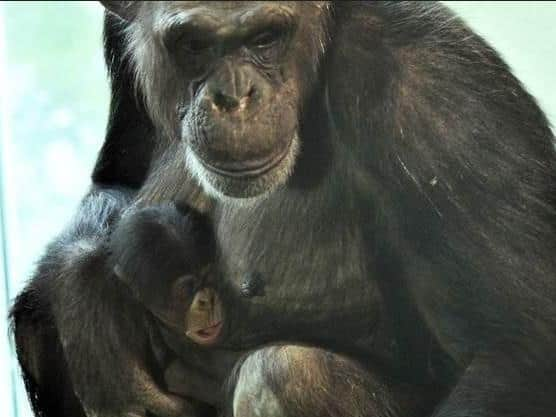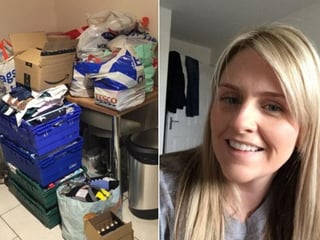Edinburgh Zoo takes extra care to prevent spread of coronavirus to chimpanzees
and live on Freeview channel 276
EDINBURGH Zoo keepers are taking extra precautions to prevent the potential spread of coronavirus to its primates -- as a leading expert warned Covid-19 could wipe out local populations in the wild if they come into contact with it.
The Royal Zoological Society of Scotland (RZSS) closed the Zoo and The Highland Wildlife Park (HWP) near Kingussie last week following government advice on coronavirus and social distancing.
Advertisement
Hide AdAdvertisement
Hide AdStaff at both sites are continuing to look after the animals in their care, but keeping direct contact to a minimum. Those required to go near primates are also wearing masks.


The moves are revealed as University of St Andrews primatologist Dr Cat Hobaiter warned Covid-19 could be fatal to chimpanzees, particularly in the wild in Africa.
Edinburgh Zoo houses a group of 16 chimpanzees, which are the closest living primates to humans and share 98% of our DNA.The attraction also has brown capuchin monkeys, common squirrel monkeys and geladas, while HWP is home to Japanese macaques.
Charlotte Macdonald, interim CEO at RZSS, said: "It is a challenging time and our amazing teams at both parks are continuing to give our wonderful animals all the care they need.
Advertisement
Hide AdAdvertisement
Hide Ad"Covid-19 is a new form of coronavirus and we are finding out more about it every day.
"As always, there is a high standard of cleaning and hygiene when it comes to taking care of our animals and we are taking extra precautions against the potential transmission of the virus. This
includes keeping any direct contact to a minimum and wearing masks around some of our more sensitive animals, such as the primates.
"Just like for everyone else, this is a new situation which is changing almost daily. We are incredibly grateful for the continued support from our fantastic members and supporters, which will be even
Advertisement
Hide AdAdvertisement
Hide Admore important over the coming months. Anyone who would like to help can find out how on our website."
Meanwhile, primatologist Dr Cat Hobaiter, a lecturer in the School of Psychology and Neuroscience at the University of St Andrews, who runs a primate research programme in Uganda, East-Central
Africa, said the coronavirus posed a real threat to wild chimpanzees.
She said: "We know that chimpanzees definitely, and probably all apes, are very vulnerable to coronavirus.
Advertisement
Hide AdAdvertisement
Hide Ad"Not only do we know they can catch the same ones we get, but when they get it it's worse for them. It is very probably lethal for chimps if they get it.
"A very mild coronavirus occurred two or three years ago, that was almost non-symptomatic for humans, but when it transferred to chimps at a site in West Africa they were very sick.
"Because apes are so vulnerable to respiratory infections -- a regular cough or cold for me is lethal for them -- we have all gone into full lock-down.
"Normally I would say that if humans are susceptible then the apes are very likely to be able to get it and maybe also the other primates. But we do know from testing in China that macaques -- a type of
Advertisement
Hide AdAdvertisement
Hide Adold world monkey -- can get it, so this does look like all primates are going to be vulnerable to it.
"What we don't know is, like with humans, some of them might be non-symptomatic or get a very mild version. But, given how infectious it is and how quickly it spreads through a group, we can't ask the
chimps to socially isolate from each other. We just need to make sure it doesn't get in to these groups in the first place.
"We really are quite worried that if this gets into the wild populations we could lose thousands or hundreds of thousands of apes in the next six months. We are on full scramble to make sure we are
doing everything we can."
